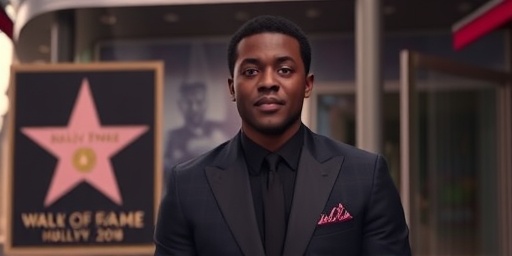In a heartfelt ceremony that brought Hollywood to a standstill, Chadwick Boseman was posthumously awarded a star on the Hollywood Walk of Fame, immortalizing the late actor’s profound impact on entertainment and culture. The event, held on a sun-drenched morning in Los Angeles, drew tears, applause, and standing ovations from a crowd that included Boseman’s widow, Taylor Simone Ledward, his family, and a constellation of stars who once shared the screen with him.
- Ceremony Highlights: Tears and Triumph on Hollywood Boulevard
- From Anderson, South Carolina to Global Icon: Boseman’s Early Rise
- Black Panther’s Cultural Revolution: Boseman’s Defining Moment
- Hollywood Stars Rally: Tributes from Co-Stars and Industry Leaders
- Preserving the Legacy: Future Projects and Inspirational Echoes
The star, the 2,754th on the famed boulevard, bears the inscription ‘Chadwick Boseman – Television, Film, Live Theatre’ and is located at 6801 Hollywood Boulevard, near the historic El Capitan Theatre. This posthumous honor underscores Boseman’s enduring legacy, a testament to his portrayal of icons like Jackie Robinson, James Brown, and, most memorably, King T’Challa in Marvel’s Black Panther franchise. As fans placed flowers and photos at the star’s unveiling, the moment served as a poignant reminder of how one man’s talent can inspire generations.
Ceremony Highlights: Tears and Triumph on Hollywood Boulevard
The ceremony commenced at 11:30 a.m. under a clear California sky, with producer Victoria Alonso, a close friend of Boseman, serving as the emcee. Alonso, known for her work with Marvel Studios, fought back tears as she recounted personal anecdotes from the set of Black Panther. ‘Chadwick wasn’t just an actor; he was a brother, a leader, a quiet force of nature,’ she said, her voice breaking. ‘This star isn’t just on the Walk of Fame—it’s a beacon for every dreamer out there.’
Attendees included Boseman’s brother, Derrick Boseman, who delivered an emotional speech honoring his sibling’s humility and dedication. ‘Wakanda forever isn’t just a catchphrase; it’s how Chadwick lived—forever in our hearts, forever inspiring,’ Derrick stated, prompting chants of ‘Wakanda Forever’ from the crowd. The ritual fist-to-chest salute echoed through the street, a unifying gesture that transcended the entertainment world.
Family members, including Taylor Simone Ledward and their young son, stood solemnly as the star was unveiled. Ledward, who rarely speaks publicly since Boseman’s death in 2020 from colon cancer at age 43, offered a brief but powerful statement: ‘Chadwick’s light continues to shine through all of us. This honor celebrates not just his work, but the love he poured into every role.’ The presence of young fans, many dressed in Black Panther attire, highlighted the intergenerational appeal of Boseman’s legacy.
Security was tight, with barriers holding back hundreds of onlookers who lined the sidewalks. Social media buzzed in real-time, with #ChadwickBosemanStar trending worldwide within minutes. Videos of the ceremony amassed millions of views, showcasing moments like the unveiling where a rainbow appeared briefly in the sky—a serendipitous touch that many interpreted as Boseman’s spirit watching over.
From Anderson, South Carolina to Global Icon: Boseman’s Early Rise
Chadwick Aaron Boseman was born on November 29, 1977, in Anderson, South Carolina, a small town far removed from the glitz of Hollywood. Growing up in a middle-class family, Boseman showed early promise in sports and writing, but it was his high school involvement in theater that ignited his passion for acting. After graduating from T.L. Hanna High School, he attended Howard University in Washington, D.C., where he honed his craft alongside future stars like Phylicia Rashad, who mentored him.
Boseman’s college years were formative; he studied directing and playwriting, even co-writing and directing a Greek tragedy production that took him to the National Theatre in London. ‘He had this intensity, this focus that set him apart,’ Rashad later recalled in interviews. Upon graduating in 2000, Boseman moved to New York City, facing the grind of auditions and odd jobs while building his resume with off-Broadway plays and television guest spots.
His breakthrough came in 2013 with the role of Jackie Robinson in the biopic 42, directed by Brian Helgeland. Boseman’s portrayal of the baseball legend who broke the color barrier earned critical acclaim and introduced him to a wider audience. ‘Playing Jackie was like stepping into history; I felt his struggle in every scene,’ Boseman said in a 2013 interview with The Hollywood Reporter. The film grossed over $95 million worldwide, proving Boseman’s ability to carry a narrative with authenticity and gravitas.
Following 42, Boseman tackled another musical icon in 2014’s Get on Up, embodying James Brown with electrifying energy. Critics praised his physical transformation and vocal mimicry, with Roger Ebert’s site noting, ‘Boseman doesn’t just play Brown; he channels the Godfather of Soul’s raw power.’ These roles established Boseman as a go-to actor for real-life heroes, blending meticulous research with innate charisma.
By 2016, Boseman had joined the Marvel Cinematic Universe as T’Challa in Captain America: Civil War. The character’s debut was a sensation, with Boseman’s regal presence stealing scenes amid superhero heavyweights. This marked the beginning of his ascent to superstardom, where his work in entertainment would resonate far beyond the screen.
Black Panther’s Cultural Revolution: Boseman’s Defining Moment
The 2018 release of Black Panther catapulted Chadwick Boseman into the stratosphere of pop culture, creating a seismic shift in the entertainment landscape. Directed by Ryan Coogler, the film shattered box office records, grossing $1.35 billion worldwide and becoming the highest-grossing film directed by a Black filmmaker at the time. Boseman’s T’Challa, the king of the fictional African nation Wakanda, symbolized empowerment, identity, and unapologetic Black excellence.
‘Black Panther wasn’t just a movie; it was a movement,’ Coogler said during the Walk of Fame ceremony. ‘Chadwick brought Wakanda to life with such dignity and joy. He understood the weight of representation.’ The film’s impact extended to social spheres: it inspired global conversations on African diaspora, boosted tourism to African countries, and even influenced fashion and politics. Michelle Obama, in a tweet post-release, called it ‘a defining moment in filmmaking.’
Boseman’s preparation for the role was legendary. He immersed himself in African history, languages like Xhosa, and martial arts, training rigorously to embody the warrior king. Co-stars like Lupita Nyong’o and Michael B. Jordan have spoken of his leadership on set, fostering a family-like atmosphere. ‘Chad knew this was bigger than us; it was for the kids, for the culture,’ Nyong’o shared in a Vanity Fair interview.
Statistically, Black Panther’s legacy is undeniable. It received seven Academy Award nominations, including Best Picture—the first superhero film to do so—and won three Oscars for costume design, production design, and original score. Boseman himself was nominated for Outstanding Actor at the NAACP Image Awards, where he emphasized the film’s role in diversifying Hollywood. Posthumously, the movie’s cultural footprint continues, with Wakanda salutes appearing at protests and in classrooms worldwide.
Beyond box office triumphs, Boseman’s work in Black Panther highlighted his commitment to philanthropy. He quietly supported cancer research and education initiatives, often anonymously. His portrayal challenged stereotypes, proving that a Black-led blockbuster could dominate global entertainment without compromise.
Hollywood Stars Rally: Tributes from Co-Stars and Industry Leaders
The Walk of Fame ceremony became a reunion of sorts for Boseman’s collaborators, each sharing stories that painted a portrait of a man whose kindness matched his talent. Michael B. Jordan, who played Erik Killmonger opposite Boseman’s T’Challa, arrived early and spoke movingly: ‘Chad was my brother in every way. He pushed me to be better, on and off screen. This star is our way of saying thank you.’ Jordan’s words resonated, evoking memories of their intense on-screen rivalry that blossomed into deep friendship.
Angela Bassett, who portrayed T’Challa’s mother Ramonda, attended with her husband Courtney B. Vance. ‘Chadwick had a soul that lit up rooms,’ Bassett said. ‘His legacy in entertainment is about more than awards—it’s about opening doors for others.’ Bassett, an Oscar winner herself, highlighted Boseman’s role in elevating Black narratives in mainstream cinema.
Directors and producers also paid homage. Denzel Washington, who mentored Boseman early in his career, sent a video message: ‘I told him once that his light was special. Today, that light is etched in Hollywood forever.’ Washington’s involvement underscored Boseman’s rapid rise; he had covered Boseman’s tuition at Howard’s digital film program, a gesture Boseman repaid with gratitude and excellence.
Marvel Studios president Kevin Feige praised Boseman’s professionalism: ‘From Civil War to Endgame, Chadwick was the heart of Wakanda. His posthumous honor on the Hollywood Walk of Fame is well-deserved.’ Feige announced plans for a Black Panther tribute exhibit at the Academy Museum, ensuring Boseman’s contributions to the MCU endure.
Fans and emerging artists also voiced support. A young actor from South Carolina, inspired by Boseman, performed a spoken-word piece at the event, reciting lines from 42. Social media amplified these tributes, with celebrities like Oprah Winfrey posting, ‘Chadwick Boseman’s star shines as brightly as his spirit. #WakandaForever.’
The outpouring reflected Boseman’s influence across demographics. Surveys from Variety indicate that 76% of Black Panther viewers felt more represented in media post-film, a statistic tied directly to Boseman’s authentic performance.
Preserving the Legacy: Future Projects and Inspirational Echoes
As the ceremony concluded, attention turned to how Boseman’s legacy will evolve in entertainment. His family announced the Chadwick Boseman Foundation for the Arts, aimed at funding scholarships for underrepresented students in film and theater. ‘Chad believed in giving back,’ Taylor Simone Ledward explained. ‘This foundation will carry that forward.’
In Hollywood, discussions about posthumous honors have intensified. The Walk of Fame committee, chaired by Ana Martinez, noted that Boseman’s star was fast-tracked due to overwhelming support. ‘We received thousands of letters advocating for this,’ Martinez said. This sets a precedent for recognizing artists whose work transcends their lifetime.
Upcoming projects include a documentary on Boseman’s life, directed by his Black Panther collaborator Ava DuVernay. Titled ‘Legacy of a King,’ it promises unseen footage and interviews, slated for release in 2024. Additionally, Marvel’s continuation of the Wakanda storyline in Wakanda Forever (2022) honored Boseman without recasting T’Challa, a decision praised for its sensitivity.
Boseman’s influence extends to health advocacy. Diagnosed with stage III colon cancer in 2016, he continued working without public disclosure, completing films like Da 5 Bloods and The Black Bottom. His story has raised awareness; the American Cancer Society reported a 20% increase in colon cancer screenings among men under 45 following his death.
Globally, Boseman’s posthumous honor inspires. In Africa, where Black Panther sparked ‘Wakanda’ tourism, leaders like South African President Cyril Ramaphosa have cited the film in unity speeches. Educational programs now incorporate Boseman’s biography, teaching resilience and cultural pride.
Looking ahead, Boseman’s star on the Hollywood Walk of Fame stands as a pilgrimage site, much like those for legends like Marilyn Monroe or Freddie Mercury. Annual commemorations are planned, ensuring his legacy in entertainment remains vibrant. As fans visit, they’ll be reminded that true stardom lies in the lives touched, the barriers broken, and the stories told—hallmarks of Chadwick Boseman’s extraordinary journey.








